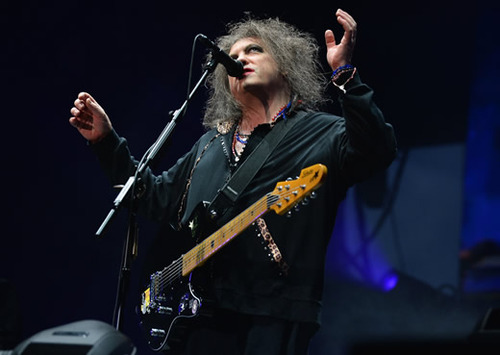|
Watching the Cure perform last night at Lollapalooza was a rich and rewarding experience, for two reasons. First, I wasn’t there. For the first time in years I wasn’t ankle deep in the Grant Park mud and debris a hundred yards from the stage trying to hear the music over the din of chatty Chads and Trixies. Instead, I was here on the West Coast with my feet up next to a pitcher of Rhett Butlers, watching the festival’s extremely well-directed live stream. Shoulda done it this way the whole time. Second, the Cure was extraordinary. I tweeted afterward that watching this concert had been an honor — seriously, a technically flawless performance that hit most of its emotional bullseyes (minus the requisite mid-show set of “happy” songs). The band was really tight, well-rehearsed. The other day I was watching a surprisingly dull Steely Dan documentary, and someone in the film takes issue with Fagen & Becker’s notorious reputation as perfectionists; he said what they actually did was push past perfection until the playing became natural. That’s what you had on stage Sunday night — a band that, despite not playing that many gigs, had infused its catalog to the point of being second nature and unstudied. I was reminded, too, of how stupendous a guitarist is Robert Smith — perhaps indicative of a post-arena rock era of virtuoso players who are nonetheless often underrated. After all those stadium wankers in the 1970s, the new wave nurtured a lot of players whose technical expertise was applied to the song as a whole rather than selfishly carving out several bars for masturbatory fret runs. To wit, a list of some others … Elliott Easton (The Cars) Easily the finest guitarist of the new wave era, Easton’s mastery of his instrument towered above his peers. He’s the perfect example of what I’m getting at here, because his lone solo album in 1985 is kinda awful — without a band to fit into, he’s a bit helpless. Listen to “My Best Friend’s Girl” for everything he can do: the taut, chuck-chuck rhythm support; the snaky countermelodies underneath the bridge, with an occasional scrape up the neck; the four-bar transitional solos marrying Buddy Holly grooves to ’80s loose-wrist jangle; that eight-bar solo — a maximum length for Easton and others — in the middle summing it all up, icing the cake. With a spoon. Bill Pitcock IV (Dwight Twilley Band) Twilley’s fusion of Elvis swagger and Lennon-McCartney tunesmithing might never have lasted four decades without the now-deceased Pitcock’s able hand at his side. The dialogue between the harmonies (Twilley’s come ons, Phil Seymour’s sweetness, themselves a potent balance) and Pitcock’s guitar in 1975’s “I’m on Fire” is just a start. So many flavors followed, from the straight-up rockabilly of “TV” to the tight shuffle of “Chance to Get Away” to the full-bore attack of “Living in the City,” Pitcock was versatile and consistent. Robert Quine The session player to eat all session players, Quine’s fretwork is often as close to off-the-rails as a player can get before completely upstaging or even obliterating the song to which he’s contributing. He’s worked with everyone from Richard Hell and Lou Reed to (my favorites) Lloyd Cole and Matthew Sweet. Prince The Purple One has been cited as an underrated guitarist for so long now that he must have finally qualified. Still, his notices tend to concentrate on other performative aspects. It doesn’t help, of course, that sometimes in his shows he hardly even picks up his guitar. Will Sergeant (Echo & the Bunnymen) Often sidestepped as some ’80s Doors knock-off, this band might have been mired in that relegation without Sergeant’s artistry. Over several albums, he blended new wave drive with psychedelic stall, all rather seamlessly. He and Ian McCulloch have been reunited now longer than the band’s original run, and the new records are usually as good. Maurice Deebank (Felt) Felt took its name from a singular vocal trick of Tom Verlaine’s, and Deebank’s guitar playing was a direct descendant of Verlaine’s own. His high-end dreamscapes tighten up into superb songcraft by 1984’s “The Strange Idols Pattern and Other Short Stories,” especially the songs “Crystal Ball” and “Dismantled King Is Off the Throne.” Reg Smithies and Dave Fielding (The Chameleons UK)
Speaking of great guitar duos, this underrated pair from the oft-overlooked Chameleons weren’t always produced in a way that highlighted their immense talents. Excellent tunes, though, and an attractive tension between them contributed to some rewarding moods. Billy Bremner A pub rocker of the finest shade, Bremner more than held his own amid tall company in Rockpile before hiring out as a session slinger, most notably on the Pretenders’ “Back on the Chain Gang” and other singles.
1 Comment
EuripidesMac
3/31/2016 10:19:29 am
Elliott Easton (The Cars)
Reply
Leave a Reply. |
this blahg
I'm THOMAS CONNER, Ph.D. in Communication & STS, and a longtime culture journalist. Categories
All
Archives
June 2024
|


 RSS Feed
RSS Feed